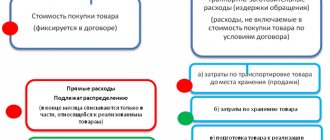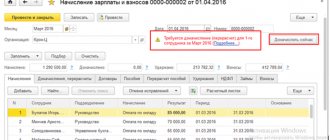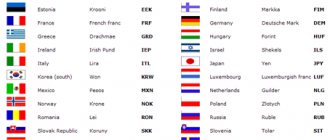Home — Documents
When sending an employee on a business trip abroad, you give him money on account: for accommodation, food and other expenses. When returning from a business trip, an employee must report the amounts spent within three days. This procedure is prescribed in clause 4.4 of the Procedure for conducting cash transactions, approved by Bank of Russia Regulation No. 373-P dated October 12, 2011 (hereinafter referred to as Regulation No. 373-P). The employee fills out that part of the expense report that is intended specifically for him. The rest of the document is prepared by the accountant. And if the advance report is filled out for a business trip abroad, the accountant needs to pay attention to some atypical nuances, which we will now talk about. If you do not have foreign business trips, this article will still be interesting and useful to you, since it will explain all the basic rules for preparing an expense report.
We prepare an advance report
Upon returning from a business trip, the employee must, within 3 working days, under your strict guidance, fill out an advance report (Form N AO-1) about the money spent on the business trip . Before submitting the expense report to the manager (other authorized person) for approval, you need to:
— check the report for correct completion, as well as arithmetic errors;
— make sure that the supporting documents indicated in the report are actually attached to it and that they are all drawn up properly.
Features of filling out travel abroad and reflecting daily allowances
An advance report on a business trip is the provision by a posted employee, within those working days after returning from a business trip, of information about the expenditure of funds issued to him by the company before the start of the trip.
The information specified in the report must be confirmed by attaching relevant documents (for example, travel tickets, receipts for payment of hotel rooms, fiscal receipts for payment of fuel if the trip was made on personal (official) transport, etc.).
The presented document can be drawn up either on a form approved by the legislator (No. AO-1), or on the letterhead of an enterprise (organization), enshrined in local acts.
Funds for a business trip abroad can be issued by the sending enterprise (organization) both in cash and in non-cash forms.
At the same time, the legislator provides the opportunity to finance foreign business trips in the currency of the destination country, in Russian rubles, as well as in international currency.
It is important that the advance report must be provided by the employee in the currency that was issued to him by the sending enterprise (indicating the conversion to rubles in a separate column).
Also, in the appropriate currency, it is necessary to return the funds that remain from the advance payment amounts (if any remain).
When filling out the submitted document, the employee should duplicate all foreign statements included in the report in Russian (colloquial language is acceptable).
Such a transfer can be made by the employee himself or by a third party.
What should be attached to the expense report
Here are the documents that must be attached to the advance report (Clause 26 of the Regulations):
- travel certificate in form N T-10 (for business trips to CIS countries with which there are agreements that border marks are not made in the international passport) (Clause 15 of the Regulations) or copies of pages of the employee’s international passport with marks on border crossing;
— documents confirming travel expenses . Moreover, if an electronic air or railway ticket was purchased, then the supporting documents may be a printout of the itinerary receipt (ticket) and boarding pass, as well as documents confirming payment for the ticket (cash register receipt or payment terminal receipts, bank statement);
— documents confirming living expenses (invoices, payment receipts);
- documents confirming other expenses (if any): for visas and medical insurance, for paying for bed linen on the train, excess baggage, entertainment services, postage, communication services, etc.
For convenience, you can take several sheets of blank paper, title each by type of expense (for example, “Transportation expenses,” “Hotel expenses,” “Other expenses”) and stick the corresponding expense documents on them.
But it doesn’t matter what the employee spent his daily allowance on. There is no need to confirm this with any checks, receipts or other similar documents.
Attach to the advance report an official assignment form for sending on a business trip (Form N T-10a) with completed section. 12 “A brief report on the completion of the task” (Clause 26 of the Regulations) is not necessary, since the tax authorities believe that the official task together with the report on its completion are not the documents necessary to confirm expenses.
There is a special approach to daily allowances
The employee receives daily allowances for himself, and their expenditure does not need to be confirmed by documents . This means that they fully fit the definition of a foreign currency advance. Therefore, they must be converted into rubles at the exchange rate on the date of issue to the employee . We, of course, do not purchase any services from the employee, however, even if we do not count the daily allowance as a foreign currency advance, there is another reason to recalculate the daily allowance exactly on the date of issue, regardless of the rate at which you calculate travel expenses.
The fact is that, according to the Ministry of Finance, for the purposes of calculating personal income tax, daily allowances issued in foreign currency before the start of a business trip must be converted into rubles precisely at the Central Bank exchange rate in effect on the date of their issue to the employee. The Ministry of Finance justifies its position by the fact that it is at the moment of receiving the daily allowance that the employee receives income. As everyone remembers, “foreign” daily allowances are not subject to personal income tax if they do not exceed 2,500 rubles. per day. Of course, one can argue with the position of the Ministry of Finance: after all, before the start of a business trip, it is not known for sure whether the employee will go on it at all (maybe he will get sick and will return all the daily allowance). Therefore, it is still too early to talk about the employee receiving income at the time of issuing his daily allowance before a business trip. But, be that as it may, the opinion of the Ministry of Finance must be taken into account.
Note
To avoid problems with calculating personal income tax, organizations often set the norms for “foreign” daily allowances not in currency, but in rubles. Accordingly, daily allowances are paid in rubles. This is also not bad for the employee: he knows whether personal income tax will be withheld from the daily allowance or not, therefore, he knows exactly the amount of the daily allowance, which he can dispose of at his own discretion.
Since for personal income tax purposes it is safer to recalculate foreign currency daily allowances on the date of their issue, it is more logical both in accounting and in accounting for profit tax purposes to recalculate foreign currency daily allowances on the same date.
It turns out that even if you adhere to the second approach, it is better to convert the daily allowance into rubles at the Central Bank exchange rate on the date of issue to the employee, and all other documented expenses in foreign currency - at the Central Bank exchange rate on the date of approval of the advance report. This is exactly what experts from the Ministry of Finance advise to do.
From authoritative sources
Bakhvalova Alexandra Sergeevna, chief specialist-expert of the Department of Tax and Customs Tariff Policy of the Ministry of Finance of Russia
“If the entire amount for the report is issued in foreign currency, in order to be reflected in the accounting documents it is necessary to recalculate it into rubles at the Central Bank exchange rate on the date of issuance of the advance. Upon returning from a business trip, the employee submits receipts confirming the expenses incurred, and also returns the unused amount. All expenses are converted into rubles at the official exchange rate of the Central Bank on the date of transactions (by checks) and are taken into account by the organization on the date of approval of the advance report. Part of the amount attributable directly to daily allowances should also be reflected in the advance report, but justification of expenses in the form of daily allowances by checks is no longer required. And, therefore, the employee has no obligation to return the unspent part of the daily allowance to the organization. Accordingly, the organization reflects the paid daily allowance in rubles at the Central Bank exchange rate on the date of issue of the advance, and then does not track the expenditure of funds in the part attributable to the daily allowance.”
Conclusion
As we see, neither tax nor accounting legislation allows us to say with confidence that any one of the two approaches proposed above is the only correct one. In most cases, your choice of one course or another for converting foreign exchange expenses will not greatly affect the result, so the cost of the issue is not so high. And even if the inspectors decide that you took the course on the wrong date, it is unlikely that this will be a significant loss for you. And if you want to argue with the inspectors, there is also a chance to defend your rightness. After all, as everyone has long since learned by heart, all doubts and contradictions in tax calculations should be interpreted in favor of the taxpayer.
Now let’s look at the procedure for filling out an advance report in two situations:
- when the employee received money from the organization in the same foreign currency in which he will spend it;
- when the employee received money in one foreign currency, and he will spend it, having previously exchanged it for another currency.
What to do if the “primary” is in a foreign language
It is logical to assume that some of the documents confirming expenses on a business trip abroad will be drawn up in a foreign language. The regulatory authorities believe that it is necessary to make a line-by-line translation of such documents into Russian on a separate sheet - either on their own or by contacting a translation agency.
For air tickets and other transportation documents issued in a foreign language, the Ministry of Finance requires translation only of the details necessary to recognize profitable expenses (passenger's full name, direction, flight number, date of departure or arrival, ticket price). Translation of information that is not essential for confirming expenses (for example, fare conditions, air transportation rules, baggage transportation rules) is not necessary.
But according to the Federal Tax Service, there is no need at all to translate an electronic air ticket into Russian. After all, such an air ticket is a unified international form of document. Therefore, most of the ticket details are filled in in accordance with the Unified International Codifier.
However, the tax authorities will probably find fault with the lack of translation of other supporting documents (except for air tickets), for example, bills from a hotel or for renting a car or taxi service, emphasizing the fact that it is impossible to establish the target nature of the expenses incurred.
And most likely, they will not miss the opportunity to charge your company additional income tax, as well as penalties and fines.
But there are chances to fight off tax claims in court. Some courts, when considering similar cases, rightly noted that:
— the Tax Code of the Russian Federation does not establish the taxpayer’s obligation to translate documents drawn up in a foreign language;
— nothing prevents the tax authority from exercising its right to suspend a tax audit to translate documents into Russian.
Advice
In order not to awaken the beast in the tax authorities, it is better to translate documents in a foreign language into Russian. Moreover, your employee who speaks the required foreign language can also do the translation, if this is part of his job responsibilities. If you apply for translation to a specialized organization, the translation costs can be included in other expenses.
Paying the employee
So, the advance report is approved by the manager. And you see that the posted employee did not fully spend the advance payment given to him or did not confirm some expenses with primary documents. In this case, he must return the unspent amount to the cashier according to the cash receipt order.
If the employee does not return the unused balance within the time allotted for the final payment of the advance payment issued to him (3 working days (Clause 11 of the Procedure)), you can withhold this amount from his salary (Article 137 of the Labor Code of the Russian Federation). To do this, it is necessary that (Article 248 of the Labor Code of the Russian Federation):
- within a month from the end of the 3-day period, the manager issued a written order to recover the unspent amount from the employee;
- the employee has given written consent to deduct this amount from his salary if it exceeds his average monthly earnings.
In the event that an employee spends more money on a business trip than was given to him, the amount of overexpenditure must be reimbursed to him. It is advisable to do this no later than the next payment of his salary.
The advance was issued in the same foreign currency in which the expenses were paid
This is the simplest situation from the point of view of drawing up an expense report. In Form N AO-1, you only need to record the amounts in foreign currency from the documents and convert them into rubles. We have already discussed above at what rate this should be done. Let's consider an example when an organization determines the ruble amount of travel expenses paid in advance at the exchange rate on the date the advance was issued.
Example. Filling out a report on a foreign business trip, when the accountable amount is issued and spent in euros
Condition
LLC "Major" sends deputy director S.I. Zvezdochkin. on a business trip to conduct negotiations with a French company. The duration of the business trip is from 09/02/2010 to 09/14/2010. The travel tickets were purchased by the organization by bank transfer.
The organization established daily allowance rates at LLC Major, including for foreign business trips, in rubles (so as not to exceed the standard not subject to personal income tax).
The daily allowance standard for France is 2100 rubles. per day.
The daily allowance standard for Russia is 500 rubles. per day.
From the cash register of LLC "Major" to Deputy Director S.I. Zvezdochkin. 09/01/2010 2,000 euros (to pay cash expenses) and 25,700 rubles were issued for travel expenses. (daily allowance). The Central Bank exchange rate as of September 1, 2010 is 39.01 rubles/euro.
09/14/2010 Zvezdochkin paid for hotel services in the amount of 2340 euros.
He prepared the advance report on 09/15/2010. On the same day, the director approved it.
The Central Bank exchange rate as of September 15, 2010 is 39.53 rubles/euro.
And on the same day, the employee was given 340 euros from the cash register (as repayment of overexpenditure).
Solution
Amount of expenses in rubles (per diem) - 25,700 rubles:
— for days spent in France — 25,200 rubles. (2100 rub. x 12 days);
— for business trip days spent in Russia — 500 rubles. (1 day - day of arrival in Russia from France - 09/14/2010).
The total amount of travel expenses in foreign currency is 2340 euros. This amount is more than the advance payment given to the employee.
Part of the amount of travel expenses within the limits of the advance payment issued (2000 euros) must be converted into rubles at the exchange rate on the date of issue of the advance payment (as of 09/01/2010 - 39.01 rubles/euro). And the remaining part (340 euros) must be converted into rubles at the Central Bank exchange rate on the date of approval of the advance report (39.53 rubles/euro).
As a result, the amount of foreign currency travel expenses in rubles will be 91,460.20 rubles.
(EUR 2,000 x RUB 39.01/EUR + EUR 340 x RUB 39.53/EUR).
The following entries will be made in accounting.
| Contents of operation | Dt | CT | Sum |
| On the date of advance payment (09/01/2010) | |||
| Currency issued from the cash register for travel expenses (2000 euros x 39.01 rubles/euro) | 71 “Settlements with accountable persons” | 50, subaccount 2 “Cashier in euros” | 78 020,00 |
| Rubles issued from the cash register as daily allowance | 71 “Settlements with accountable persons” | 50, subaccount 1 “Cashier in rubles” | 25 700,00 |
| As of the date of approval of the advance report (09/15/2010) | |||
| Travel expenses reflected (RUB 78,020 + EUR 340 x RUB 39.53/EUR) | 26 “General business expenses” | 71 “Settlements with accountable persons” | 91 460,20 |
| Daily allowances reflected | 26 “General business expenses” | 71 “Settlements with accountable persons” | 25 700,00 |
| There is no need to withhold personal income tax from daily allowances, since they do not exceed non-taxable norms (2100 rubles/day < standard 2500 rubles/day, 500 rubles/day < standard 700 rubles/day). Daily allowances are also not subject to insurance premiums. | |||
| The issue of overexpenditure to the employee in euros is reflected (340 euros x 39.53 rubles/euro) | 50, subaccount 2 “Cashier in euros” | 71 “Settlements with accountable persons” | 13 440,20 |
Reverse side of form N AO-1
| Number in order | Document confirming production costs | Name of document (expense) | Expense amount | Debit account, sub-account | ||||
| according to the report | accepted for accounting | |||||||
| date | number | in rub. cop. | in currency (in euros) | in rub. cop. | in foreign currency | |||
| 1 | 2 | 3 | 4 | 5 | 6 | 7 | 8 | 9 |
| 1 | 14.09.2010 | 85646 | hotel bill | 91 460,20 | 2 340 | 91 460,20 | 2 340 | 26 |
| 2 | 15.09.2010 | a/o N 63 | per diem abroad | 25 200,00 | 25 200,00 | 26 | ||
| 3 | 15.09.2010 | a/o N 63 | daily allowance Russian. | 500,00 | 500,00 | 26 | ||
| Total: | 117 160,20 | 2 340 | 117 160,20 | 2 340 | ||||
We take into account travel expenses
how the main business trip expenses are recognized for tax purposes .
| Type of expenses | Income tax | Personal income tax | Insurance contributions to the Pension Fund, Social Insurance Fund, Compulsory Compulsory Medical Insurance and Compulsory Compulsory Compulsory Medical Insurance | |
| Daily allowance in the amounts provided for by local regulations or collective agreement | Fully included in expenses | Not withheld from amounts not exceeding: (or) 700 rubles. per day - for business trips around Russia; (or) 2500 rub. per day - for business trips abroad. If the daily allowance was paid in a larger amount, then the excess amounts are subject to personal income tax | Not credited | |
| Daily allowances for the day of arrival from a business trip abroad must be paid according to the norm established for business trips in Russia (in rubles). And even if the regulations on business trips adopted by your company state that daily allowances for the last day of a business trip are paid in the same amount as for all days of a business trip abroad (for example, 2,500 rubles), only 700 rubles will not be subject to personal income tax. If daily allowances were paid in foreign currency, then in order to compare the amount of daily allowances with the established ruble standard for the purpose of calculating personal income tax, you need to convert them into rubles at the official exchange rate in effect on the date of payment of daily allowances (and not on the date of approval of the advance report) | ||||
| Travel expenses: — to the place of business trip and back (including business class or in SV carriages); — to the airport, train station, pier (including by taxi) and back | Counted into expenses without restrictions | Doesn't hold | Not credited | |
| Expenses for renting residential premises - subject to availability of supporting documents | Counted into expenses without restrictions | The entire hotel payment amount is not deducted. If there are no supporting documents, then personal income tax is imposed on amounts in excess of: (or) 700 rubles. per day - for business trips around Russia; (or) 2500 rub. per day - for foreign business trips | Not credited. If there are no supporting documents, then the amount reimbursed to the employee is not subject to contributions within the limits established in the local regulations. If you have not established such standards, then urgently supplement your business travel regulations with a procedure for reimbursing employees for unconfirmed expenses in order to avoid paying contributions | |
| Expenses for service in bars, restaurants, in the room, as well as fees for the use of recreational and health facilities (for example, a fitness room, sauna, etc.) are not taken into account for profit tax purposes. | ||||
| Costs for processing and issuing visas, international passports, vouchers, invitations, etc. | Counted into expenses without restrictions | Doesn't hold | Not credited | |
| Payment for communication services | ||||
| Payment for services of VIP lounges (superior lounges) at airports | ||||
| You can justify the cost of paying for VIP rooms, for example, like this: service in the VIP room provides access to telephone and other types of communications, as well as access to the Internet, which allows a business trip employee to quickly solve production problems that require his participation | ||||
How to correctly recalculate foreign exchange expenses based on the results of a business trip abroad
Foreign business trips for company employees are by no means uncommon. Experts from the financial department told us at what rate to recalculate foreign currency expenses for “profitable” purposes if an employee received a ruble advance before going abroad.
Reference point - to the “currency” certificate
According to Art. 168 of the Labor Code of the Russian Federation, the company is obliged to compensate the posted employee:
- travel and rental expenses;
- additional costs associated with living away from home (per diem);
- other expenses incurred by this “physicist” with the permission or knowledge of the employer.
If a specialist is sent on a trip abroad, he will be additionally compensated for:
- expenses for obtaining a foreign passport, visa and other travel documents;
- mandatory consular and airport fees;
- fees for the right of entry or transit of motor vehicles;
- expenses for obtaining compulsory health insurance;
- other payments and fees that cannot be avoided.
This is what Clause 23 of the Regulations on the Peculiarities of Sending Workers on Business Trips, approved by Decree of the Government of the Russian Federation of October 13, 2008 No. 749, prescribes.
What exact amount of actual expenses must be compensated for an employee sent on a business trip abroad? The amount in Russian rubles that he spent to purchase foreign currency spent on the territory of a foreign state is subject to reimbursement.
Let's move on to the norms of Chapter 25 of the Tax Code. Subclause 12 of clause 1 of Article 264 of this regulation states that business travel costs are taken into account as part of other expenses associated with production and sales. It is important that, unlike personal income tax and insurance contributions, there are no limits provided here. Let us remind you that personal income tax and contributions are levied on daily allowances exceeding the amount of 2,500 rubles for each day the employee is on a foreign “voyage” (clause 3 of article 217, clause 2 of article 422 of the Tax Code of the Russian Federation).
Let’s assume that the company issues an accountable amount (advance) in rubles to an employee going on a trip abroad. This employee acquires the necessary currency on his own, after which he spends it on travel, accommodation, telephone conversations and other expenses in the interests of the organization. And upon returning, the specialist submits an advance report to the accounting department with a primary acquittal attached to it. At what rate should expenses incurred by an employee in this “voyage” be reflected in tax accounting?
This rate must be taken from the certificate of purchase of foreign currency by a business traveler. If there is no such document, expenses paid in foreign currency are converted into rubles at the Bank of Russia exchange rate on the date of issuance of accountable amounts (advance payment) to the employee. This is exactly what financiers recommend to do in letter dated 07/05/2019 No. 03-03-06/1/49809. This conclusion is based on an analysis of the provisions of Article 272 of the main tax document.
Currency conversion is carried out on behalf of a specific citizen. Therefore, the organization does not carry out such transactions for the purchase of foreign cash in accounting.
Documents confirming expenses drawn up in a foreign language must be translated into Russian. This can be done either by a professional translator or by a specialist from the organization itself (letter of the Ministry of Finance of Russia dated April 20, 2012 No. 03-03-06/1/202).
Let us note that travel expenses are in any case recognized on the date of approval of the advance report (subclause 5, clause 7, article 272 of the Tax Code of the Russian Federation).
Overspending is a different story
The position expressed by the Ministry of Finance is well-established (see letters dated January 21, 2016 No. 03-03-06/1/2059 and dated September 3, 2015 No. 03-03-07/50836). Although earlier financiers thought differently. They indicated that if there is no currency exchange document, the company’s expenses for a business trip abroad must be recalculated at the exchange rate on the date of approval of the expense report (letter dated March 31, 2011 No. 03-03-06/1/193). Moreover, the fiscal officers echoed their colleagues (see letter of the Federal Tax Service of Russia dated March 21, 2011 No. KE-4-3/4408). Apparently, this position is now no longer relevant. However, it would be a good idea to clarify this issue with your tax office.
It also happens that an employee on a foreign “voyage” does not have enough money. He bought additional currency with his own money and incurred expenses for the benefit of the company in addition to the ruble advance received. In this situation, the recalculation rules will be different. For the part of these funds (i.e. compensation for overspending), take the exchange rate of the Central Bank of the Russian Federation on the date of approval of the employee’s advance report. Unless, of course, he provided a certificate of purchase of currency (letter of the Ministry of Finance of Russia dated 06/06/2011 No. 03-03-06/1/324).
Example. Rules for converting currency expenses
Before leaving on a business trip, an employee received an advance in the amount of 30,000 rubles.
On this trip, the employee spent 520 euros. At the same time, the specialist submitted to the accounting department a certificate of purchase of 400 euros at the rate of 71 rubles. There is no such document for the remaining amount of 120 euros (520 - 400).
The euro exchange rate on the date of issuance of the advance is 70.55 rubles, on the date of approval of the advance report – 71.25 rubles.
The company's accountant first recalculated 400 euros at the rate from the certificate and received 28,400 rubles. (400 euros × 71 rubles). The balance of the advance payment issued to the employee is 1,600 rubles. (30,000 – 28,400). It covers only 22.68 euros at the exchange rate of the Central Bank of the Russian Federation on the date of issue of the accountable amount (1,600 rubles / 70.55 rubles/euro). The remaining amount spent by the “physicist” of 97.32 euros (520 – 400 – 22.68) is his overspending on a business trip. The company's accountant recalculated it at the Bank of Russia exchange rate on the date of approval of the advance report and received 6,934.05 rubles. (97.32 euros × 71.25 rubles). This is the amount that must be returned to the employee.
The total amount of expenses for a business trip abroad is 36,934.05 rubles. (28,400 + 1,600 + 6,934.05). The accountant reflected it in tax accounting at the time of approval of the employee's advance report.
What if the ruble advance was transferred to the employee’s bank card or he was given a corporate card in rubles? That is, the money on the card is in rubles, and payments from it during a trip abroad will be made in foreign currency. In such a situation, to recalculate the foreign exchange expenses of a company employee, take the exchange rate set by the bank on the date of debiting the funds. This rate can be confirmed by a certificate of the movement of money in the account, certified by a credit institution (letters of the Ministry of Finance of Russia dated January 22, 2016 No. 03-03-06/1/2318 and dated July 10, 2015 No. 03-03-06/39749).







